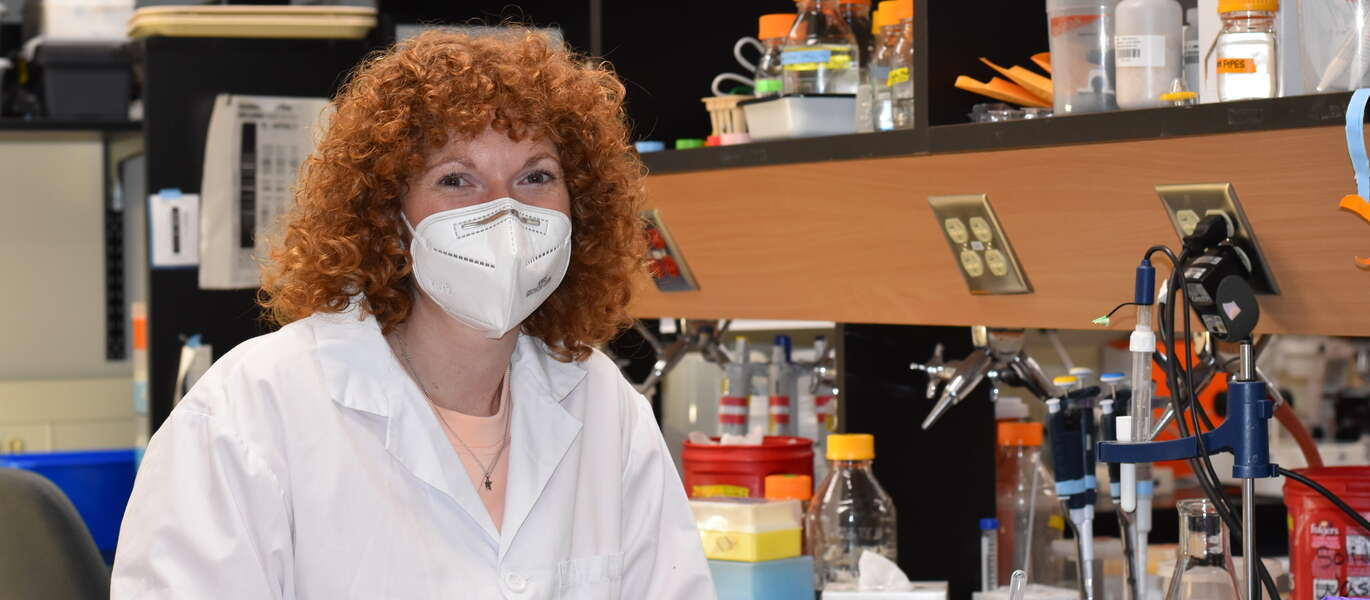A University of Guelph professor is using her own lived experience as a scientist and mother to highlight the unique perspective of others like her, building a network of support in the process.
Dr. Jennifer Geddes-McAlister, a professor in the Department of Molecular and Cellular Biology, is the founder of Moms in Proteomics, which brings together women in the field to share stories of successes and challenges and professional resources.
The initiative began as a call to other mothers to inquire whether their experiences mirrored her own. “I think that being a mom and being a scientist is special, and I wanted to see: Do other people feel the same way?”
Gathering feedback, Geddes-McAlister presented the idea with others on a conference panel and was then asked to write an academic paper on it, published in Trends in Biochemical Sciences.
Lack of diversity in STEM leaves women underrepresented
The dearth of women in STEM is well documented, Geddes-McAlister said, as it is a field long dominated by men that lacks diversity in general. After nearly 15 years in her specific field of study, she knows “there is a need, and space, for more women in proteomics.”

The shortfall of representation affects advances in the field and opportunities for innovation, she said.
Through discussions with other women in proteomics, writing grants, eliciting reviewers and contacting perspective supervisors for a post-doc position, Geddes-McAlister confirmed that many of the field’s leaders are men.
“This is not unexpected given traditions in STEM; however, recent initiatives dedicated to promoting diversity are making great strides in many fields of study,” she said.
Still, a lack of representation of women remains and with it comes a lack of representation of mothers.
“The intersection of professional and personal lives for mothers is very distinct,” she said, noting it is difficult to strike a balance, particularly in recent years when many are working from home and caring for young children. “I think that needs to be recognized and embraced to establish a platform for change.”
For example, women have historically experienced different professional concerns when deciding to have children, Geddes-McAlister wrote in her paper. The time away from work required to have and raise a child can result in falling behind peers, losing networking or advancement opportunities and, in some cases, financial concerns.
Taking action on equity, diversity, inclusion
“I think this is a changing time where the importance and value of EDI (equity, diversity, inclusion) is acknowledged and openly discussed so that ideas become more than words; rather, they are put into practice,” she said. “I think we can really capitalize on that.”
Moms in Proteomics provides support for mothers to share experiences, vent frustrations and build professionally inclusive relationships. The point, Geddes-McAlister said, is to build a community of support and a network for promoting women and mothers in the field.
Proteomics is the large-scale study of proteins, a field that informs human, animal and environmental sciences. With the technology’s increasing popularity comes accessibility and opportunities to welcome new talent, Geddes-McAlister said.
“You need highly skilled and qualified people to feed into Canada’s rapidly growing biotechnology and biopharmaceutical industries and support these sectors, which for Canada, are becoming much more economically important and powerful.”
Parenting, family and career a delicate balance
For a younger generation of scientists, representation is vital, she said, adding “I had very good mentors.” During her PhD, Geddes-McAlister said, her mentor was supportive of her pregnancy, helping her navigate the balance between science and being a mom.
“This served me well for the birth of my second child during my post-doctoral fellowship in another country.” She now sees herself a role model for other women in STEM, having recently been named among five U of G faculty to be granted a 2022 Early Researcher Award from the Government of Ontario.
Still in its early stages, Moms in Proteomics has provided Geddes-McAlister with a “whole new network” of experts who understand the delicate balance among parenting, family and career. It also provides professional support such as research publication reviews, grant applications or recommendation letters.
“Whatever lived experience you have, you tend to bring that into your perspective,” she said. “That in itself brings innovation because someone has a unique view or has a different idea to address a common problem.”
Contact:
Dr. Jennifer Geddes-McAlister
jgeddesm@uoguelph.ca
